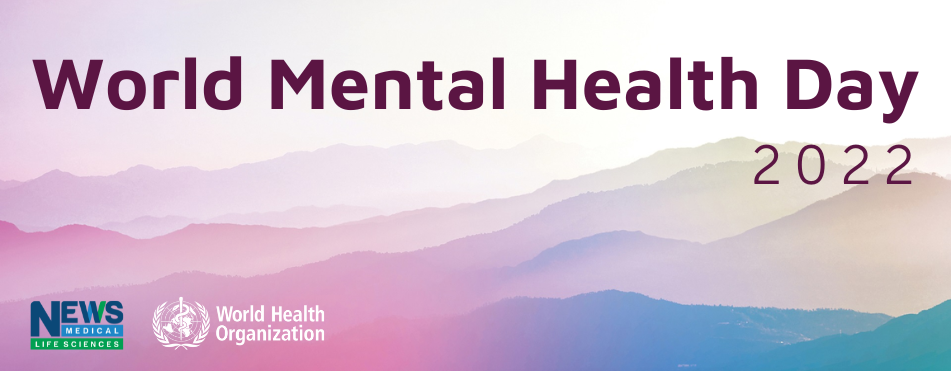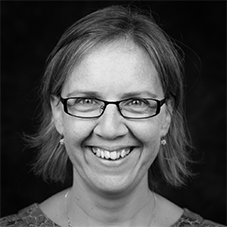I trained as a psychiatrist in the UK, and then I came to Ethiopia to do my Ph.D., which involved looking at the epidemiology and the impacts of perinatal depression on women and their children. I've lived and worked in Ethiopia for 15 years. My work has shifted direction, and now I'm more focused on expanding access to care for people with mental health conditions. That tends to involve the co-development, testing, and implementation of different sorts of psychological interventions, service models, and health systems strengthening approaches.

Earlier this year, you were appointed as one of the new directors of the Centre for Global Mental Health. Could you tell us about the center's mission, vision, and approach?
I'm one of three directors with Professor Crick Lund and Dr. Ritsuko Kakuma. The center started in 2009 and was very much focused on addressing inequities experienced by people with mental health conditions around the world, particularly focusing on low and middle-income countries. That remains still at the heart of the center's mission and vision.
The focus of the Centre is to enable people with lived experience of mental health conditions to attain the highest possible level of health and to participate fully in society and at work, free from stigmatization and discrimination. So very much focused on putting people with lived experience at the center.
There are three strands to what the center does. There's the research strand around producing contextually relevant evidence that can be relevant for local settings but also have a global impact. Secondly, to strengthen capacity when we work with partners in low and middle-income countries and to work to establish equitable partnerships. Thirdly, to work across stakeholder groups. So to engage not just in the research community but also involve people with lived experience, policymakers, and other stakeholders.
Perhaps one of the distinctive things that marks out our center compared to others is that two directors are not based in London. I'm in Ethiopia, and Crick is in South Africa. We very much see that as part of the first step in recognizing that the center is a distributed center across our many partners and collaborations around the globe. The focus that we have is on shifting that center of gravity to our low and middle-income country partners because we very much recognize that global mental health needs to have really strong leadership from the global south.
You have lived and worked in Ethiopia for over 10 years. What has your work taught you about the current state of global mental health? What are the main obstacles you currently face in your work?
There've been so many encouraging developments in the field, but we certainly have a long way to go. Not just in Ethiopia or Africa more broadly but also globally. The pandemic brought mental health into people's homes and certainly increased awareness that this was a neglected problem, but that has not necessarily translated into greater commitment or funding to expand care or promote the human rights of people with mental health conditions, and those key gaps remain.
We've managed to develop a great deal more knowledge about how to expand access to mental healthcare in culturally and contextually relevant ways. For example, the UK AID-funded PRIME project, the Program for Improving Mental health carE, which worked in Ethiopia and also four other low and middle-income countries to integrate mental health into primary care. We showed how this approach can work in practice and that it can deliver benefits as well for people with mental health conditions and their families.
Another example in Ethiopia, as part of an NIH-funded Africa focus on intervention research, we ran a randomized clinical trial that showed that mental health delivered in primary care by primary healthcare workers was both safe and effective.
Those studies really help us when we're advocating; they strengthen our arguments for expanding access to care, and they also help to give implementers some kind of sense of what needs to be done. More broadly, there are some really positive changes, like more donors now supporting implementation, not just small research projects. The service user mobilization is much greater, so the voices of people with lived experience are much better represented.

Image Credit: Dragana Gordic/Shutterstock.com
Compared to 15 years ago, there are so many people working in this area now, and they come from different backgrounds, they've got different approaches, so there's a lot more diversity and creativity in the way that we sort try to address these big problems that we have to overcome. So in that sense, there's quite a lot of momentum and a much stronger platform for change.
A key obstacle that we face in Ethiopia, which is also a factor in many other countries, is that mental health goes hand-in-hand with poverty. One leads to the other and sets up a vicious cycle. We can't adequately respond to the needs of people with mental health conditions just by providing treatment. We need much more of a multi-sectorial response, for example, including economic interventions. But systems are not very well set up for multi-sectional organization and coordination. It does need much stronger commitment, and I think that is probably the biggest thing we need to address now.
Even though most people affected by mental illness live in low and middle-income countries, most mental health care resources are located in high-income countries. How does the resultant 'treatment gap' affect individuals, and what can be done to close the gap?
The lack of access to care and protection of human rights that somebody experiencing mental health condition may be exposed to can have profound effects. The key ones I would highlight are discrimination and human rights abuses, impoverishment and mortality, or premature mortality. Clearly, human rights abuses against people with mental health conditions occur around the globe. They're not specific to low and middle-income countries. Still, in poorly resourced settings, poorly resourced in terms of services, these violations of rights do get exacerbated by people not being able to access adequate and effective care.
For example, a person may be restrained by their family in the home because families have run out of options and don't see any alternatives. We've done work showing that family members don't want to do this. They just see it as they've got no other choice.
In terms of poverty, in Ethiopia, our research has shown that households that include a person who's got a severe mental health condition like schizophrenia, bipolar disorder are twice as likely to have severe food insecurity, and that's because of several factors. Partly they spend a lot of money searching for treatments that can help. Those could be traditional and religious healing settings, or it could be the scarce mental healthcare. There are the lost earnings from caregivers and the person themself. Of course, crucially, societal exclusion compounds poverty because people cannot access sort of opportunities for their livelihoods or share economic burdens within communities.
My Ethiopian colleagues have a long history of working on research with people with mental health conditions. They showed that, even in rural Ethiopia, a person with a severe mental health problem is at substantially higher risk of premature death. That is partly due to non-accidental death but mostly due to infectious disease and undernutrition, again reflecting the lack of access to care and discrimination.
On the more positive side, in the PRIME project in Ethiopia, when we expanded people's access to mental healthcare within the primary healthcare setting, we showed that 12 months in, people were less likely to have been restrained in the home setting, that the households were substantially less likely to have food insecurity, and they reported much less discrimination.
Treatment alone is not enough. We need multi-sectoral support to respond.
How has the COVID-19 pandemic affected the reach of mental health interventions, especially in low and middle-income countries?
I've been able to co-lead a project looking at this, co-led with Professor Sir Graham Thornicroft, and working with teams from seven low- and middle-income countries to examine the pandemic's impact on mental health services. We worked in Chile, Ethiopia, Georgia, Nigeria, South Africa, Sri Lanka, and Ukraine. There's been a lot of talk about the impacts at the general population level. There's been much less scrutiny of the impacts on people with existing mental health conditions and services.

Image Credit: Lightspring/Shutterstock.com
We found profound effects of the pandemic on access to care, mostly due to interruptions in that service and the availability of those services. Also, there was obviously a contribution from transport restrictions and people being fearful of coming to health facilities. Across all of those countries, those countries who had mental health care integrated within primary healthcare settings pre-pandemic or were able to expand such provision appeared better able to maintain mental healthcare and withstand the disruptions.
It wasn't just whether care was there or not. In our study, respondents noted that care became more narrowly biomedical, just about treatment prescriptions, and that psychological therapies were quickly canceled, social interventions disappeared, and that they took a long time to be reinstated, a long time after the acute phase of the pandemic.
There were some positive impacts in terms of people thinking of creative ways to overcome the difficulties in delivering care. That did include some examples of different technological approaches. It was interesting that it was much more difficult for that to be successful in low-income countries. Even in upper-middle-income countries, they reported that it was difficult to get to the people who most needed it. Those more marginalized populations were less likely to have access to technology even though they were also those least able to access mental health care. So, technology is not a panacea on its own.
Perhaps one of the best ways to be resilient to a situation like the pandemic that overwhelmed mental health systems is to strengthen the primary care setting, which allows mental health care to be much closer to people's homes, so there's much more chance that they'd be able to access it if transport and moving around becomes difficult.
The theme of 2022's World Mental Health Day is 'Make mental health and wellbeing for all a global priority.' What does this theme mean for you personally, and how can we participate in actualizing this goal on a societal level?
For me, this is about ensuring that those with the greatest needs are not ignored. What I'm focusing on in this World Mental Health Day call is the “for all” part. One of the key things that I feel very strongly that I will do all I can to support is strengthening the voices of people with lived experiences of mental health problems.
So in Ethiopia, we are doing some work with our mental health service user association, and we've got some new funds to co-develop some interventions around raising awareness and reducing stigma. That work would involve supporting and equipping people with lived experience of mental health conditions to advocate, present their testimonies and see if they can increase prioritization and commitment to mental health care and better inclusion of people with mental health conditions.
How can we all participate? We can sometimes feel a bit overwhelmed by the scale of the problem, but there's always something that can be done at the individual level. We can always do more to try and recognize within ourselves and our families, our friends, and our colleagues when things are not going well and when people are perhaps at risk of developing mental health problems or seem to clearly have symptoms of mental health conditions. We can respond in a way that can enable people to seek help.

Image Credit: melitas/Shutterstock.com
Perhaps most important of all is to try to stay with people through their mental health journey rather than separating away. I think sometimes we may only be able to walk alongside people when they have mental health problems. We may not feel able to do anything else, but that can be really important.
Despite mental and physical health playing equal roles in overall wellbeing, there is still a societal stigma around mental health. Why do you believe this stigma remains in present-day society?
I would like to bring to attention The Lancet Commission on ending stigma and discrimination in mental health, which is taking place on World Mental Health Day. It lays out that stigma associated with mental health problems is often reported as being worse than the effects of the illness itself. As you suggest, the corrosive effects of stigma are persistent in all societies in one form or another.
So why is that? I do think that it's a complex problem. There are many contributors, but I think a big contribution comes from inadequacies in providing health and social care to people with mental health conditions. Because when people can access care in a timely way that meets their needs and enables them to recover, the general public can see that, and that's an extremely potent antidote to stigma. I think seeing people supported and able to live in the community, a “rubbing of shoulders” with everybody else, is perhaps one of the key things that can help reduce stigma.
The Lancet Commission is a great report that was co-produced with people with lived experiences. You can see as you read through the scientific component of it, you can see many examples of people's experiences, their poems, and the way they've responded to stigma, for example. It sets out what we can do and what can be done worldwide to address stigma.
How do you believe that commemorative days like World Mental Health Day help alleviate the stigma around mental health and wellbeing globally?
It's always good to talk, and I do firmly believe that the more discussions there are around mental health, the more it becomes a mainstream concern and the more likely that is to erode stigma. This year, the WHO launched its World Mental Health report, and that's the first such report that's taken place in 20 years. They'll be referring to that and showcasing that in a mental health forum, which involves a really diverse number of stakeholders from the member states of the World Health Assembly, so policymakers, but also people lived experience and implementers as well.
It sets out a blueprint for transforming mental health for all. It's written in a very accessible way and has the potential to be useful for a wide range of people who are somehow involved in trying to improve mental health. We can use many important messages and information to challenge stigma and strengthen our advocacy for mental health. So World Mental Health Day is a good opportunity for us to look at these initiatives. I think 2022 is a particularly important year because we've got this seminal WHO report that sets out things that could be done over the next 10, or 20 years.
While these commemorative days help to focus our attention, of course, we do need to remember that mental health is a concern for people around the world every day, and so our response needs to be sustained across the whole year.
What is next for yourself and your research?
We've got a really exciting new project (HOPE) that is working in the area of homelessness and severe mental illness, which is a very visible problem in every country of the world, and yet still manages to be overlooked in terms of response. People who have a mental illness and are also homeless are often systematically excluded from mainstream services and may often have complicated needs that require a coordinated approach.
In HOPE, we'll be working in Ghana, Ethiopia, and Kenya with a diverse group of people, including mental health service user associations, policymakers or collaborators, and the WHO. We'll be looking at rights-based approaches within the community to try to respond to these complex needs and the priorities and the preferences of people who are on the streets and have a mental health problem.
We've also got a project called SCOPE, where we are studying the context of psychosis in Ethiopia to improve outcomes. We are trying to inject some urgency into the way that we respond to psychosis so that we achieve earlier and better care.
In Ethiopia, the average time from developing symptoms to getting treatment is five years, which is associated with poorer outcomes. We are looking for ways to reduce that long period and work out what kinds of early interventions would help people recover more quickly and completely. This will not look anything like an early intervention for psychosis programs in the west or high-income countries.
Part of the focus of the project is to recognise that we have much less information about what psychosis is in non-Western settings and what the particular needs of people might be, particularly in the early phases of developing psychosis. A particular area of focus will be on family-based interventions, the role of traditional and religious leaders, and peer support.
The third stream of work I'm involved in, in Ethiopia is evaluating the World Health Organization's caregiver skills training package for children with developmental disabilities.
About Prof. Charlotte Hanlon
I am a British psychiatrist who lives and works in Ethiopia.  I am a Professor of Global Mental Health at King’s College London, co-director of the Centre for Global Mental Health, and co-director of the WHO collaborating center for mental health research and training at KCL. I have an adjunct position with the Department of Psychiatry and the Centre for Innovative Drug Development and Therapeutic Trials for Africa at Addis Ababa University, Ethiopia.
I am a Professor of Global Mental Health at King’s College London, co-director of the Centre for Global Mental Health, and co-director of the WHO collaborating center for mental health research and training at KCL. I have an adjunct position with the Department of Psychiatry and the Centre for Innovative Drug Development and Therapeutic Trials for Africa at Addis Ababa University, Ethiopia.
The main focus of my work is on developing, testing, and implementing interventions that seek to improve the lives of people with mental health conditions in low- and middle-income countries. I have a particular interest in working with people affected by severe mental health conditions, including psychoses and developmental disabilities. I was co-editor (with Professor Vikram Patel) of the revised edition of Where there is no Psychiatrist, which is free to download (https://www.cambridge.org/core/books/where-there-is-no-psychiatrist/47578A845CAFC7E23A181749A4190B54). I led the first service trial in a low-income African country for people with severe mental health conditions, showing that primary care workers could deliver mental health care as safely and effectively as mental health professionals (https://www.thelancet.com/journals/lanpsy/article/PIIS2215-0366(21)00384-9/fulltext).
Current projects include HOPE, an NIHR global health research group on homelessness and severe mental illness (co-PI with Professor Atalay Alem), SCOPE, a Wellcome Trust-funded study of the context of psychosis in Ethiopia to inform outcomes (PI), PROMISE, a Wellcome Trust-funded study on improving detection and care for people with psychosis in Malawi (PI Professor Stephen Lawrie), and PRIZE, an MRC-funded project to pilot a peer support intervention for people with psychosis in South Africa (co-PIs Dr. Laura Asher, Dr. Carrie Brook-Sumner). I am country PI on SPARK, an NIHR funded cluster randomized controlled trial of WHO’s caregiver skills training for children with developmental disabilities in Ethiopia and Kenya (PIs Dr. Rosa Hoekstra, Prof. Amina Abubaker): https://www.thesparkproject.net/home. I am a commissioner on the Lancet Commission on Ending Stigma and Discrimination in Mental health (launch 10th October 2022) and on the Lancet Psychiatry Commission on Psychoses in Global Context (https://www.thelancet.com/journals/lanpsy/article/PIIS2215-0366(21)00234-0/fulltext).